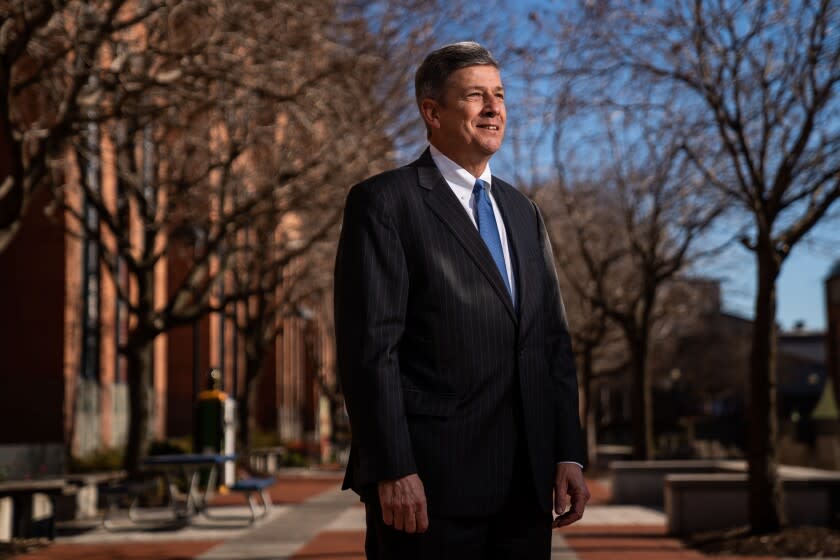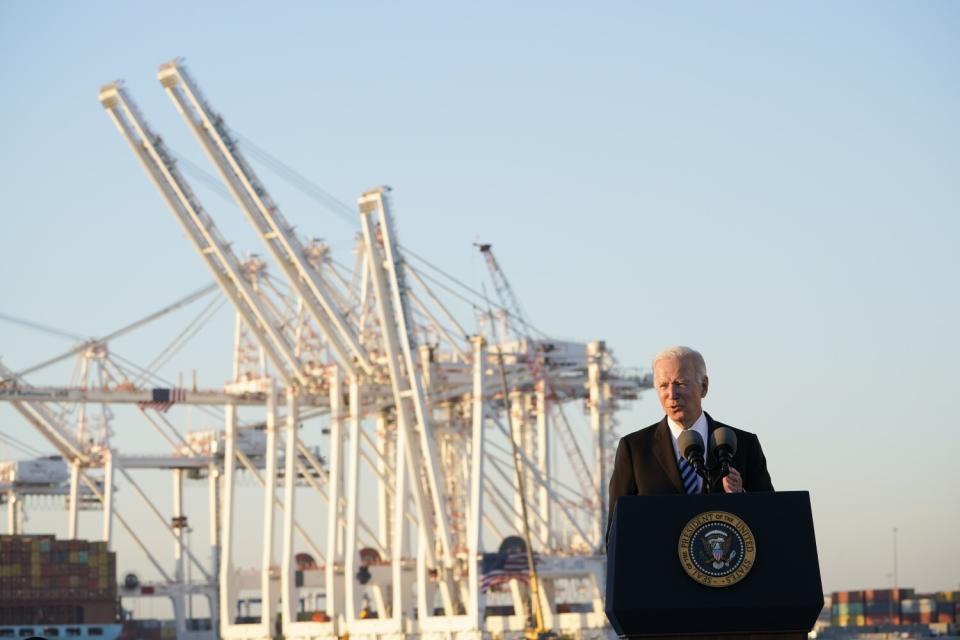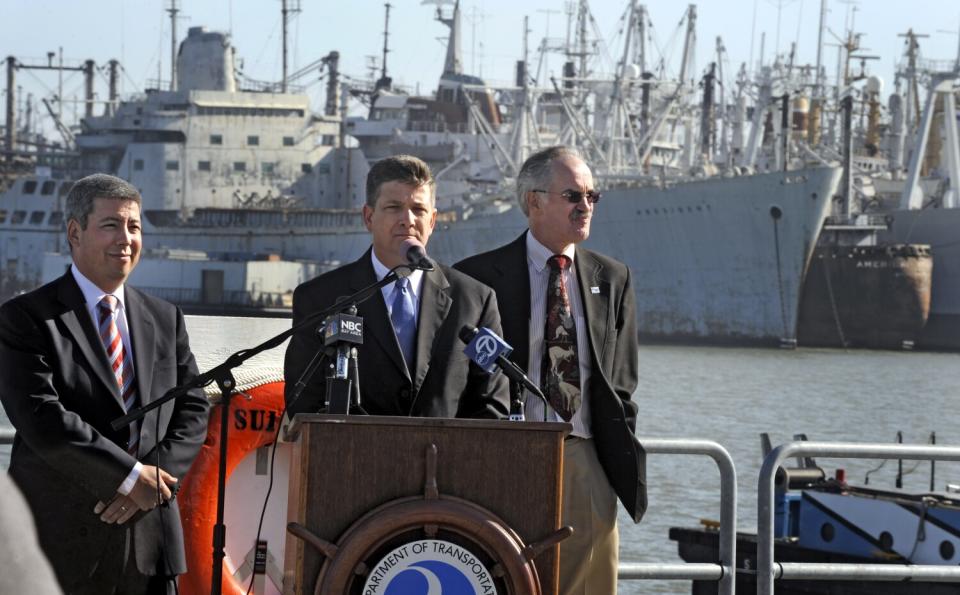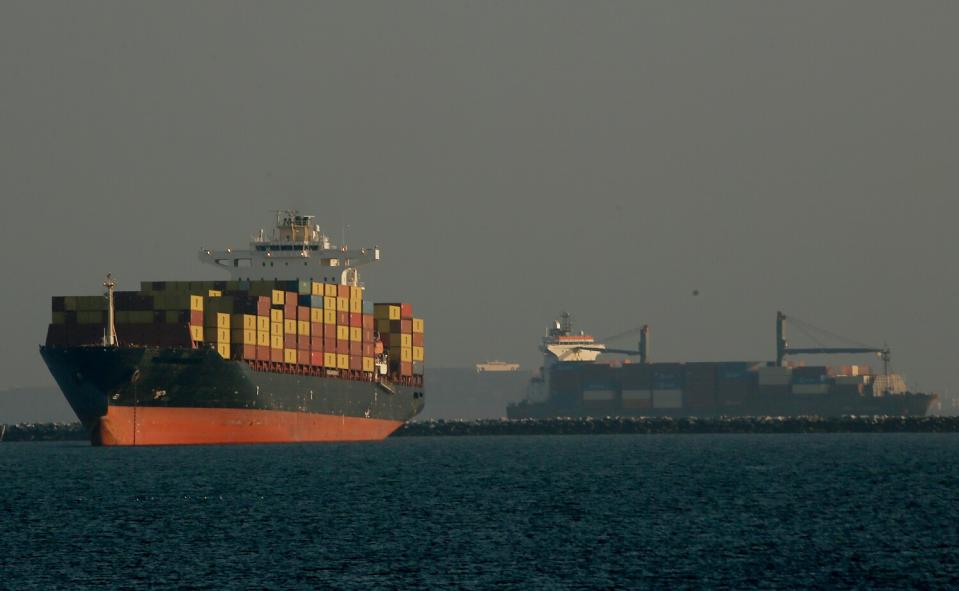John Porcari wants a Christmas miracle for the supply chain. Just don't ask him to find your Amazon package

- Oops!Something went wrong.Please try again later.
- Oops!Something went wrong.Please try again later.
Judging by his resume, John D. Porcari was a natural choice to serve as President Biden's point person for untangling the country's supply chain. His decades-long career is the bureaucratic version of "Planes, Trains and Automobiles."
But it might come as a surprise to his family that Porcari is responsible for fixing shipping and trucking bottlenecks to ensure Americans get their holiday gifts on time.
“I hate shopping," Porcari said in an interview with The Times. "Whatever is out there two days before Christmas is typically what they get.”
“Buying things,” he added, “is not my thing."
However, it is very much a thing for the rest of the country, which has emerged from its pandemic-induced recession on a record-breaking shopping spree, straining the long-neglected supply chain that gets goods from Point A to Point B, with stops at Points C, D and E along the way. Americans who never questioned how an endless array of products can land on their doorstep with a single click have found themselves struggling to get what they want — and they are not happy about it.
That logistical problem quickly became a political one, contributing to inflation that has reached its highest level in four decades. Rising costs have eroded higher paychecks, undermining American enthusiasm for an otherwise growing economy and handing Republicans a talking point that they're sharpening for next year's midterm election.
Biden responded in August with the time-honored Washington practice of putting someone in charge of solving the problem, tapping Porcari, a 63-year-old veteran of high-level state and federal transportation posts, to be his "port envoy."
"Sometimes you think twice before throwing a new position at a problem," Transportation Secretary Pete Buttigieg said. "But in this case, it was easy."
Once Porcari accepted the job, he could almost never get through a conversation with friends or family without getting ribbed about how long they were waiting for their new couch or appliance to arrive.
"I told them we’d open containers at Long Beach until we found it for them," he joked.

Mr. Fix-It
Porcari has been a fix-it guy for years. After struggling to find a job with his political science degree, he went to work in construction, even becoming an apprentice electrician. The skills have come in handy, and he's built two additions on his family's home in a small town outside Washington.
He later earned a master's in public administration, and he developed a reputation for collaboration during two stints as head of the Maryland Department of Transportation, the first one starting in 1999. It's the only state agency of its kind that's responsible for a major seaport and airport, as well as roads and public transit.
Porcari played a leading role in developing Baltimore's port into the country's largest "roll on, roll off" facility, making it a key waypoint for exporting agricultural and construction vehicles that are manufactured in the Midwest.
He also investigated why wheels kept falling off the city's buses, a problem that mystified officials until it was traced back to the mechanics.
“They were torquing the bolts on so hard, they were basically stretching the metal on the threads,” Porcari said. “And the more it happened, the more they torqued it on.”
Former Maryland Gov. Martin O’Malley, who hired Porcari for his second tour of duty as state transportation secretary, described him as "one of the most capable public administrators that I’ve ever worked with."

Unlike bureaucrats who hoard information and protect their own fiefdoms, he said, Porcari would seek transparency and teamwork.
"He understands the new way of management and leadership that's required," O'Malley said.
Porcari later joined President Obama's administration in 2009, working as a deputy to Transportation Secretary Ray LaHood for four years.
“The deputy secretary pretty much runs the day-to-day operations, and that’s what John pretty much did while I was secretary,” LaHood said.
It was Porcari’s opportunity to work with Biden, too. Then the vice president, Biden was in charge of implementing the American Recovery and Reinvestment Act, a package of stimulus programs intended to help the country climb out of the financial crisis.
Porcari described him as a “taskmaster” who brought “a giant binder of projects” to meetings.
“If you weren’t prepared, God help you,” he said.
Freeing the logjam
Now Porcari is back in the hot seat at a critical moment for the economy.
Although supply-chain challenges stretch across the globe, from Chinese factories that shut down at the first sign of coronavirus infections to American trucking companies that can’t find enough drivers, Porcari’s focus has been the logjam at the ports of Los Angeles and Long Beach, where nearly half of the country’s imports arrive.
When he started the job this summer, scores of cargo ships were idling off the coast while stacks of containers piled up on the docks like an unwinnable game of Tetris. Although the supply chain relies on various organizations and companies working in close coordination with each other, no one was in charge of a system that had broken down.
Now Porcari hosts Zoom meetings three days a week with the port directors, labor groups, shipping companies and others, brainstorming ideas and prodding everyone to make progress.
“It’s an accountability mechanism to make sure people are doing the things they said they would do,” said Sameera Fazili, who works closely with Porcari as deputy director of Biden’s National Economic Council. “If something is not happening, we can quickly surface why it’s not happening.”

One obstacle was the fact that the docks were crowded with containers that were waiting for days or weeks to be picked up. Sometimes cargo lingered when retailers didn't need it immediately, such as Halloween decorations that arrived too late or patio furniture that arrived too early. Meanwhile, imported parts needed on American assembly lines were getting stuck.
A breakthrough came with the decision to threaten fines on shipping companies if containers were allowed to linger on the docks for longer than six or nine days, depending on how they were being picked up. The fines would start at $100 per container, and rise from there.
Gene Seroka, executive director of the Port of L.A., said his "stomach was in knots" when they made the announcement in October, knowing that companies would be upset.
"I got dropped from some holiday card lists," Seroka quipped.
However, containers started flowing off the docks, and no fines have been issued. At Long Beach, the number of containers dwelling for at least nine days has fallen by 34% since Oct. 28. At Los Angeles, it's dropped by 56% since Oct. 24.
"It turns out, sometimes you need a stick," Fazili said. "You can't always use carrots."
'Not a light switch'
Not everything has gone according to plan. There are fewer ships idling near California's coast, but there are more further offshore. When the two numbers are combined, the total is roughly the same as it was months ago.
It's also been slow going to expand operations on the docks. Biden announced on Oct. 13 that the Port of Los Angeles would "begin operating 24 hours a day, seven days a week," following a similar step taken at the Port of Long Beach. However, overnight work remains rare.
Porcari defended the shift as "a process, not a light switch."
"You're not going to open your distribution center 24/7, until you know the ports are functioning 24/7, and until you're sure that trucking is available 24/7," he said.
Buttigieg said he's pleased with the progress that has been made on the supply chain and credited Porcari with developing ideas such as pop-up container yards in Georgia and South Carolina, freeing up space closer to the port in Savannah. Rather than clogging the docks and the surrounding area, cargo is sent miles away by rail.
"There's a common-sense aspect to it," Buttigieg said. "But it's also exquisitely difficult to do something original and make it work."
Porcari isn't sure how much longer he'll stay in the job, which he said was envisioned as a short-term role. But in the meantime, he's trying to shift his focus to more long-term projects that will put the supply chain on more stable footing in the future.
"It's arguably the lifeblood of the economy," he said. "And we have systematically underinvested in it."
This story originally appeared in Los Angeles Times.

